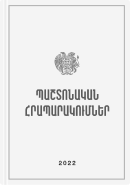ՀԱՅԱՍՏԱՆԻ ՀԱՆՐԱՊԵՏՈՒԹՅԱՆ
ԱՐԴԱՐԱԴԱՏՈՒԹՅԱՆ ՆԱԽԱՐԱՐՈՒԹՅՈՒՆ
|
27 հունվարի 2005 թ. |
N 9 |
ՊԱՇՏՈՆԱԿԱՆ ՏԵՂԵԿԱՏՎՈՒԹՅՈՒՆ
ՀԱՅԱՍՏԱՆԻ ՀԱՆՐԱՊԵՏՈՒԹՅԱՆ ԿԱՌԱՎԱՐՈՒԹՅԱՆ 2004 ԹՎԱԿԱՆԻ ԴԵԿՏԵՄԲԵՐԻ 23-Ի «ՀԱՅԱՍՏԱՆԻ ՀԱՆՐԱՊԵՏՈՒԹՅԱՆ ԿԱՌԱՎԱՐՈՒԹՅԱՆ 2003 ԹՎԱԿԱՆԻ ՄԱՅԻՍԻ 29-Ի ԹԻՎ 793-Ն ՈՐՈՇՄԱՆ ՄԵՋ ՓՈՓՈԽՈՒԹՅՈՒՆՆԵՐ ԵՎ ԼՐԱՑՈՒՄՆԵՐ ԿԱՏԱՐԵԼՈՒ ՄԱՍԻՆ» ԹԻՎ 1828-Ն ՈՐՈՇՄԱՆ ՈՒԺԻ ՄԵՋ ՄՏՆԵԼՈՒ ԺԱՄԿԵՏԻ ՄԱՍԻՆ
«Իրավական ակտերի մասին» ՀՀ օրենքի 46-րդ հոդվածի 2-րդ, 62-րդ հոդվածի 6-րդ և 91-րդ հոդվածի 5-րդ մասերի պահանջներից ելնելով՝ ՀՀ արդարադատության նախարարությունը հայտնում է, որ`
Հայաստանի Հանրապետության «Պաշտոնական տեղեկագրի» 2005 թվականի հունվարի 19-ի թիվ 4 (376) համարում հրապարակված` 2004 թվականի դեկտեմբերի 23-ի «Հայաստանի Հանրապետության կառավարության 2003 թվականի մայիսի 29-ի թիվ 793-Ն որոշման մեջ փոփոխություններ և լրացումներ կատարելու մասին» թիվ 1828-Ն Հայաստանի Հանրապետության կառավարության որոշումն ուժի մեջ է մտնելու պաշտոնական հրապարակմանը հաջորդող օրվանից` հունվարի 20-ից, թեև որոշման ուժի մեջ մտնելու ժամկետ է նշված 2005 թվականի հունվարի 1-ը, քանի որ, այն ֆիզիկական և իրավաբանական անձանց իրավունքները սահմանափակող, գործունեության նկատմամբ հսկողություն կամ վերահսկողության կարգ սահմանող կամ փոփոխող, ինչպես նաև դրանց վիճակն այլ կերպ վատթարացնող նորմեր չի պարունակում:
| Իրավական ակտերի փորձաքննության վարչության պետ՝ |
Կ. Խտրյան |



